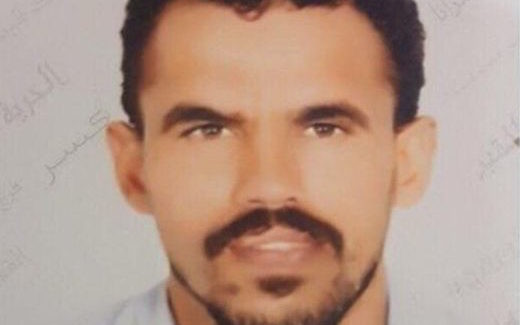Hasan Ateya Mubarak, an employee of a company, was 37 years old when he was arrested by Bahraini authorities from his home in Karzakan. During his detention, he was subjected to torture and threats and was subsequently tried in an unfair trial. He is currently serving his sentence in Jau prison.
On 6 August 2017, at 3:00 A.M., plainclothes officers entered Hasan’s home without presenting an arrest warrant and apprehended him. The officers accessed the home through his bedroom window without prior notification or knocking on the doors. Additionally, they entered the home before his wife could put on her hijab, causing fear and distress among his children and wife. When Hasan inquired about the reason for his arrest, he received no response.
Following the raid, the officers blindfolded Hasan and kept him incommunicado for two days. After this period, he was permitted to contact his family and inform them that he was detained at the Criminal Investigations Directorate (CID).
Hasan was detained at the CID for one month, during which the officers subjected him to torture using various methods, including physical beatings, electric shocks, and forced standing for extended periods. He was not permitted to sit until meals were served. If he requested water or needed to use the bathroom, the officers would beat him with weapons and the heels of their shoes before fulfilling his request. In addition to physical torture, Hasan also endured psychological torture, with threats to kill his twin brother, along with insults targeting him and his religious beliefs.
His older brother, Mohamed, was also arrested the same night, and the guards subjected them to torture in close proximity, making them hear each other’s screams. During Hasan’s torture, officers interrogated him for information regarding his twin brother Husain and pressured him to confess to the charges against his brother by telling him, “Your brother confessed to the charges against you.” Despite the various torture methods, Hasan didn’t provide any information. Consequently, the officers shifted their focus to accusing him of manufacturing weapons and coerced him into confessing to the charges brought against him.
At this point, it became evident that the arrest was driven by revenge against his twin brother Husain. The Public Prosecution Office (PPO) charged Hasan with multiple crimes, including possession, manufacture, and use of weapons without a license, financing terrorism, and participating in training with a terrorist cell.
Hasan was denied access to his lawyer during the investigation and trial periods, and his confessions were subsequently used against him in court. Despite informing the judge about the torture he endured to elicit confessions, his pleas went unheard.
After a month of investigation, Hasan was transferred to the Dry Dock Prison, where his family was able to visit him for the first time since his arrest. His face and body features exhibited signs of beating and fatigue. He endured various pains, particularly back pain, and requested to see a doctor on several occasions, but each time he was neglected.
On 21 November 2019, the court convicted Hasan on charges of 1) joining an organization whose purpose is to disrupt the law or attack rights and freedoms, and 2) committing the crime of money laundering. On 6 April 2020, the court sentenced Hasan to ten years in prison, in addition to a fine of 100,000 Bahraini dinars. Hasan appealed his sentence, and in April 2021, the Court of Appeal upheld his initial sentence and rejected the appeal. Subsequently, he was transferred to solitary confinement without an explanation for the reason.
Hasan is currently held in Jau Prison, and one of the most prominent violations he has recently endured is being deprived of communication and treatment for persistent back pain.
Hasan’s arbitrary detention, forced disappearance, torture, insult based on sect, unfair trial, solitary confinement, and denial of family contact constitute violations of Bahrain’s obligations under the Bahraini Constitution and international treaties. These treaties include the Convention against Torture and Other Cruel, Inhuman or Degrading Treatment or Punishment (CAT), the International Convention on the Elimination of All Forms of Racial Discrimination (CERD), the International Covenant on Civil and Political Rights (ICCPR), the International Covenant on Economic, Social and Cultural Rights (ICESCR), as well as the United Nations Standard Minimum Rules for the Treatment of Prisoners, commonly known as the Nelson Mandela Rules.
Therefore, Americans for Democracy & Human Rights in Bahrain (ADHRB) calls on the Bahraini government to fulfill its human rights obligations by immediately and unconditionally releasing Hasan. Alternatively, ADHRB urges the government to at least ensure that Hasan receives an appropriate retrial that adheres to due process and fair trial conditions. Additionally, ADHRB calls on the Bahraini authorities to investigate the allegations of torture, threats, sect-based insults, and ill-treatment against Hasan. This investigation should include holding the perpetrators accountable and providing compensation for the harm that Hasan suffered as a result of the torture and unfair trial.





